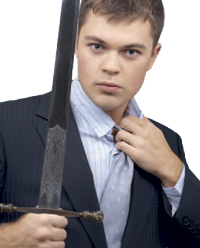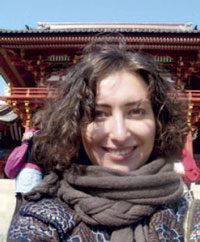JAPAN AND SINGAPORE: THE PATH OF THE SAMURAI AND THE PATH OF THE BUSINESSMAN
Ironically, my initial acquaintance with Singa pore began at the airport in Bali. A hyper-sociable Brit who had come to Indonesia on a business trip was flaunting his Singaporean passport and praising his second home to all accidental fellow travellers around him. "What buoyant and brimming with energy entrepreneurs live in Singapore! They must have no sombre thoughts about the present and future!" I caught myself thinking then.

Indeed, to an outsider, Singapore may appear an economic paradise, a land of milk and honey. "One of Asia's four dragons", "the economic world wonder" and "the Asian Switzerland" – all these descriptions instil amazement and awe at the same time. On one hand, Singapore's cleanliness is not what one usually fi nds in Southeast Asia, along with the absence of ecological issues (at least those obvious to a tourist's eyes). Th ere is always the wonderful orderliness of all aspects of Singaporean life that purports the common concept of Singapore as the "city of the future".
Japan springs to mind in this context, but there is a diff erence between the younger "economic wonder" of Singapore and that of Japan, which is much older. You may say that comparing these two countries is not really justifi ed. Japan is a mono-ethnic country, with 97.8 per cent of the population being Japanese, which has ancient traditions and was initially totally and later partially closed off from the infl uences of the West. Singapore, on the other hand, is one of the world's most multicultural countries with four offi cial languages and rich intercultural and international relations in the past and present. Besides, the history of Singapore does not comprise centuries like Japan. But the two countries really diff er that much?
Various points come to mind. Firstly, despite an offi cially-accepted constitutional monarchy and twoparty system, a spirit of conservatism reigns in Japanese politics. Up until a couple of years ago, when the opposition party came to power, it was the liberal democrats who had ruled the country for over 50 years. Besides, Japan's echelons of power are characterised by clannishness and succession. Is it not similar to Mr. Lee Kuan Yew's 30 years of continuous rule in Singapore as head of the People's Action Party and the role he and his family played in managing the Lion City?
We must also bear in mind that Japan, like Singapore, is poor in natural resources and energy sources, yet it swift - ly overcame the devastating aft ermath of World War II, which was more serious for Japan as a defeated party. Similarly, Singapore did not dally in the post-war years and, starting from 1965, when it obtained independence and was left to its own devices, it has been rapidly developing its economy. Th e young state had to move forward, looking for innovative solutions and approaches. However, what the land of the rising sun did have and what the Lion City lacked were many centuries of nurturing the spirit. Obviously, Confucianism, which appeared in China and penetrated the rest of Asia, has played its part in the economic achievements of both countries. According to Confucius, a righteous life constitutes putting societal ideals and values above those of the individual, and deems it vital to respect one's superiors, elders and, consequently, the state, the fl ourishing of which everyone must contribute to within one's abilities. Only educated and wise people must have ruling positions. Th is all looks simple enough and obvious, doesn't it? However, there are numerous examples in history, including those of our time, that prove otherwise.
In Singapore, where about 80 per cent of the population is ethnic Chinese, Confucianist postulates are widely known, at least cursorily, which allowed for their easy implementation. In Japan, apart from, the Bushido code has been used for centuries to regulate society ("bushi" means "warrior" and "do" stands for "path"). Th is path of the samurai is also enriched by Buddhist and Shintoistic principles. I would call the Singaporean moral and ethnic code that has been forming for a few decades now "bizhinesumanudo": the path of the businessman, a kind of Confucianism mixed with direction and the personal example of Singapore's political leaders, including that of Mr. Lee Kuan Yew, the country's fi rst prime minister.
Singapore has achieved the desired mentality and course of action of an ideal citizen, which usually takes generations and centuries to shape, in a short amount of time – in just a few decades. Th is ingeniouslyexecuted initiative is refl ective of the spirit of the 20th century, whose most signifi cant trait was the compression of space and time. Indeed, since we have succeeded in transforming the three-hour ritual of preparing and eating a meal into a 10-minute aff air of fast food, why can't we speed up other "saturation" processes – not only of the body, but of the mind – as well? However, the wise fi nding of Mr. Lee raises some questions: "How well is this new path embedded in Singaporeans' hearts and heads, as they have not had a centuries-old drill? How many generations of law-abiding Singaporeans are needed before all the notorious signs about fi nes for breaking rules can be removed without fear that the following day everything will go back to the way it used to be?"

Yet, today, there is no room for pessimism. Singapore is still the most stable country in the world, ranking fourth in terms of GDP. I want to believe that the path chosen by the island-state – a free economy with not fully realised personal freedoms of the individual – is lasting and right. Now, China is trying to apply the same model, even though under the Communist banner, to a much vaster territory, and the rest of the world is starting to be concerned about the Asian dragons closing in on its heels.
By Maria Slautina
|
 +65 6696 7068
+65 6696 7068
 info@meridian103.com
info@meridian103.com
 PDA
PDA
 +65 6696 7068
+65 6696 7068
 info@meridian103.com
info@meridian103.com
 PDA
PDA

ninoemmanuel49@gmail.com
Thanks ..
Mr Nino, 2016-05-24